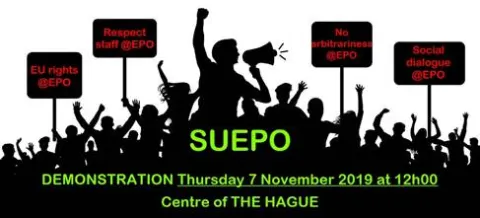Protest in The Hague against deteriorating working conditions at the European Patent Office
November 8, 2019
Back to sad old days at the European Patent Office. Last Thursday, hundreds of EPO staff members protested outside the Portuguese Embassy in The Hague against the lack of justice and deteriorating working conditions at the EPO. They are also concerned about the way the management is pushing for reforms without proper consultation of staff representatives.
It was the first time a protest was held in The Hague under the presidency of EPO president António Campinos, who has the Portuguese nationality. Last month, a demonstration was organized in Munich around the meeting of the Budget and Finance Committee.
Campinos has been in office since July 2018 after years marked by unrest and conflicts under his predecessor Benoit Battistelli. Despite many conversations with staff members and pledges to improve the social climate, his presidency has disillusioned many. As the announcement of Thursday’s demonstration, which was organized by the trade union SUEPO, put it:

Anonimity
Protesters in The Hague told the regional public broadcaster Omroep West that Campinos has failed to restore the social dialogue with staff members. One of them said: ‘This is because the team around the president is still the same. So even with a new president nothing changes.’ He or she only wanted to speak on condition of anonymity with Omroep West: ‘There is a culture of fear at the EPO. Even giving this interview makes me feel uncomfortable. If I am recognized on photos, this will surely have consequences at work. So we don’t want such photos to be published.’
Staff are particularly concerned about plans of the EPO to cut costs which, according to the Office, is inevitable for the long-term financial sustainability. This conclusion is based on the 2019 Financial Study, carried out by Mercer and Oliver Wyman. The aim of the study was ‘to identify to what extent funded and unfunded benefits in 2038 are covered by pension assets or available cash surplus’. The conclusion: the ‘Financial Study 2019 indicates a coverage gap in all but the Optimistic scenario in 2038 (…). As a crucial next step, potential measures should be identified which the EPO management can consider to close the gap and ensure financial sustainability of the Office. Suitable measures are required to reduce the benefit funding gap, increase the available cash surplus or deliver on a combination of both’.
The Financial Study was criticized earlier on this blog in a post by Thorsten Bausch, who signalled a remarkable contrast between the 2019 Financial Study and the 2018 success report of the Battistelli administration, which stated ‘High cash surpluses have been generated in the 2010-17 period (EUR +2.4 billion) and the EPO is now in a stronger overall financial position both in its ability to finance future liabilities and in its treasury.’
Bausch discussed the Financial Study more in detail before concluding: ‘I would summarize that it is a pure myth that EPO is “poor” and that active measures would therefore be necessary to cut costs, particularly staff costs and pensions. On the contrary, staff has demonstrably become more effective, so if anything, I would argue that they have rather deserved a reward.’
CSC: ‘No contact’
Bausch was certainly not the only one to question the findings of the study. In this document dated 29 October 2019, the Central Staff Committee of the EPO pointed out that the Reserve Fund for Pensions and Social Security (RFPSS) ‘is at an all-time high , and has already reached the level the Financial Study predicted only for 2025. This year’s return is in excess of 11%, and thus the second best in the history of the RFPSS. It more than offsets the losses of last year. The EPOTIF [EPO Treasury Investment Fund] is likely to have had similar results. It is also not apparent how an increasing demand for European Patents fits into a scenario where the EPO can no longer set fees at a level to cover its needs.’
The CSC also pointed out the huge difference between the 2018 and 2019 reports: ‘At the beginning of his term, Mr Campinos contracted two further consultants (Mercer and Oliver Wyman GmbH) to conduct the “Financial Study 2019”, which concludes that the EPO is in serious trouble. This study came just months after his predecessor, Mr Battistelli, presented the results of the previous financial study claiming the exact opposite based on the reforms (read: salary cuts) he undertook.’
Staff representatives have been excluded from discussions about the financial future, the CSC wrote: ‘During both of these studies, there was no contact with the CSC. As to the “Financial Study 2019”, the CSC is not represented in the newly created Financial Study Steering Group, even as an observer.
After this exercise behind closed doors, the Office presents a Financial Study which contradicts the established consultants, PPCmetrics and the AAG, and uses unprecedented assumptions, thus creating an urgency which even the President admits is not apparent today but only, perhaps, in 20 years’ time.’
‘No gap to be closed’
Remarkably critical, as well, was Curt Edfjäl, Chairman of the EPO Pensioners' Association and former vice-president of the EPO who was in charge of Administration and Finances. Half October, he sent an analysis to the Budget and Finance Committee and the EPO’s Administrative Council, calling into question the financial coverage gap and the way it has been calculated. The summary says it all: ‘(…) For reasons presented in this document, the Association concludes that the negative size of the coverage gap is largely overestimated. The measures envisaged, which could have a serious financial impact on our present and future members are dependent on the size of the gap calculated. The Budget and Finance Committee and the Administrative Council are requested to ask the Office to make a more realistic calculation of the size of the gap before final presentation of measures to be taken are proposed to the Administrative Council in June 2020.’
And also: ‘Our analysis shows that it could be argued that there is no gap to be closed.’
Circumventing staff representatives
Despite the criticism, the management seems determined to go ahead as planned, and has reportedly found an innovative way to hear what staff members think should be the way ahead. Instead of discussing measures with staff representatives in the CSC or the SUEPO, as would seem the most logical way in this highly complex issue, all staff members have received individual requests to tell the team managers which of the ten proposed measures to cut costs they would prefer. They can file their answers to their managers next week at the latest. It is only after this exercise that four representatives nominated from amongst elected LSC and CSC members are invited to discuss the proposals with four members of the senior management team.
Why the management has chosen to contact all staff members individually has not been made clear, but it seems quite strange and inappropriate to do this without consulting - and a way to circumvent - official staff representatives. If this is the idea of social dialogue of president Campinos and the EPO management, it is very likely discontent among staff will not wither away any time soon and more demonstrations and strikes can be expected.
You may also like















On board of the Titanic
Just heard that a huge number of newcomers joined the EPO Academy for examiners in October in The Hague: FIVE. For youngsters working at EPO makes no sense: a repetitive work to be performed under very unhealthy time/production pressure and no attention to quality, a career with no perspective of personal development, under 5 years' contracts with no guarantee of permanent employment and all this with the risk of being fired within a click of fingers at HR's discretion: what a surprise that this does not the masses any longer.
SPatel
Management has no interest in consulting Staff Representatives. As SRs work hard to understand the topics thrown at them within the short time given to them (reading the "Financial Study" requires a bit more than a week, understanding it, the methods used, where the numbers came from,... a lotlonger, yet Staff Representatives have done an excellent job in dissecting the "study" within such a short time), but the president wants to confront SR with "faits accomplis". Budget and Finance Committee has already given the go ahead. The president already started telling staff members that now his hands are bound, as the member states representatives have voted yes on the set of measures. And he wants to divide staff, by telling staff representatives that staff has voted in favour... There is no gap! The EPOffice is a monopolist, the "concurrents" mentioned in the financial study as reason why fees cannot be increased cannot issue European Patents, they issue National Patents. To get the same coverage, the fees via the national routes would exceed the route via the EPOffice by far, without any assurance that you would get the same coverage in all of the states you'd actually choose to request a National Patent....
A friend of the EPO
It is sad to see the EPO be run into the wall under the “guidance” of pseudo-managers who consider the EPO as the playground of their desire for power by which they try to hide their disgraceful inability. Nowadays fake news are not only to be seen in politics, just look over the Atlantic, but one can see them creeping up in an international organisation, but here one wonders to the benefit of whom. The new financial study is just a big fake! By his latest actions, and by keeping in place the most disgraceful minions as well as the staff policy introduced by his predecessor, the actual president has abundantly shown that he has no interest whatsoever in social peace, and he is only there to continue the deconstruction of the EPO started by his predecessor. It would be interesting to see the contract signed by the past two presidents in order to see how much money they can expect when behaving like an elephant in a porcelain shop.
MaxDrei
As our Friend of the EPO recommends, follow the money. We would if we could but we can't. And why's that? Because the former President has helped the members of the Administrative Council of the EPO to see how a conspiracy between those Members and the President can deliver a delightful flow of real money, out of the EPO and into the coffers of the AC Members. In a national organisation there would be a level of legal supervision, transparency, the Rule of Law. But in an international organisation there are no such controls. If the organisation in question operates in the world of sport, there is public interest. So then there are investigative journalists, whistle-blowers, and lurid headlines in newspapers. No such things worry EPO President and his enablers on the AC though. Not enough public interest to make them even mildly nervous. Even the users of the EPO couldn't care less. That's because they are big corporations (who have more important matters on their minds) and their faithful servants the patent attorneys. They, more than anybody, know who butters their parsnips: their clients, not the taxpayer or the EPO. So they remain knowingly complicit in a swindle, an outrage against transparency, employee rights and the Rule of Law. The outcome of all this? The AC Members, the President, and those within the EPO who serve them continue to be blithely insouciant. Like Joni Mitchell warned us: You only know what you've got when it's gone. It's the things that change so slowly (like the climate) that are hardest to see disappearing. I've been watching the EPO for more than 40 years. Until recently, it was something to be admired. But under its immediate past President, it lost a lot. Many had high hopes that the coming into office of the current President could arrest the downward path. What is it that explains his failure? Is he powerless against the AC? Is he too blind to see? Or is he yet another with his snout in the money trough, using his term of office to line his own pockets? In the past, the UK Member on the AC might have helped the cause. But can you expect that these days, under Prime Minister Johnson.